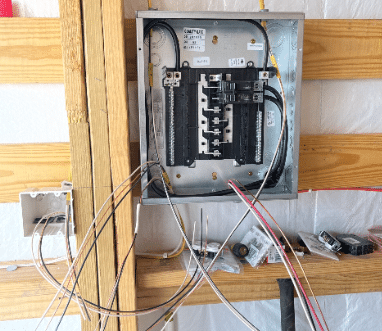Protect Your Home From Unexpected Energy Spikes
If you live in Fort Collins, CO—where lightning storms, power outages, and energy-demanding appliances are part of everyday life—a whole-house surge protector might not be a luxury. It could be a necessity. With the rise of smart devices, electric vehicles, and sensitive electronics in modern homes, the risk of damaging power surges is higher than ever.
But how do you know if it’s time to invest? Below, we break down key signs, energy risks, and surge protection solutions that Fort Collins homeowners should understand.
What Is a Power Surge—and Why Should You Care?
A power surge is a sudden spike in voltage that travels through your home’s electrical system, often triggered by lightning, utility company issues, or even large home appliances like HVAC systems or air conditioners cycling on and off. These spikes can destroy electrical components in your TVs, computers, charging stations, furnaces, and even refrigerators in seconds.
Unlike a basic power strip, a whole-house surge protector is installed directly into your electrical panel, protecting all the outlets and electrical devices connected throughout your home.
Signs You Need a Whole House Surge Protector
1. Your Home Was Built Before 2020
Many homes built before 2020 were not equipped with whole-home surge protection, leaving their electrical systems vulnerable to power surges caused by lightning strikes, utility grid fluctuations, or even large appliances cycling on and off. Building codes and awareness around surge protection have evolved in recent years, but if your home predates these changes, it may be time to consider an upgrade to safeguard your investments and avoid costly repairs.
2. You Own High-End Electronics or Smart Home Devices
If your home features smart TVs, home automation systems, gaming consoles, or security systems, they’re especially vulnerable to voltage spikes. A surge protector helps safeguard these high-investment items.
3. You’ve Experienced Power Surges or Frequent Outages
If you’ve noticed flickering lights, tripped circuit breakers, or your electronics randomly shutting off, those may be signs of past surges—and indicators of more to come.
4. You Live in a Storm-Prone Area
Fort Collins is no stranger to snow and hail storms, which can cause unpredictable surges throughout the electrical grid. Surge protection gives you added peace of mind during storm season.
5. You Have Hardwired Appliances
Large systems like air conditioners, furnaces, or water heaters are often directly wired into your home’s power supply. A surge could easily damage these units, leading to expensive electrical repairs.
6. Your Home Is Older or Recently Remodeled
Older electrical wiring or breaker boxes may not be up to current safety standards. If you’ve recently upgraded your electrical panel or done any major home improvements, it’s smart to include surge protection as part of the electrical services.
Benefits of Installing Whole House Surge Protection
- Full-Home Coverage: Unlike plug-in protectors, whole-house systems defend all your circuits—even your garage, basement, and outdoor landscape lighting.
- Reduces Fire Risks: Surges are a major source of electrical fires. Protection minimizes safety hazards and helps you stay compliant with the National Electrical Code.
- Cost-Effective Long Term: Replacing one major appliance can cost more than the system itself. Avoid unexpected costs and protect your investment.
- Peace of Mind: Whether you’re working from home, charging your electric vehicle, or running a smart thermostat, surge protection lets your family run smoothly—without disruption.
What to Consider When Choosing a Surge Protector?
- Surge Protection Rating: Look for a minimum 40kA–80kA capacity. Higher numbers handle larger surges.
- Clamping Voltage: A lower rating (around 400V or less) means better protection.
- UL 1449 Certification: Only choose units certified for residential use to ensure safety and reliability.
- Electrical Panel Compatibility: Ensure your electrical system can handle the installation. If unsure, contact a qualified electrician to evaluate your home.
- Professional Installation: A licensed electrician can ensure correct wiring, optimal placement, and regulatory compliance.
Protect Your Fort Collins Home with PH Electric
Whether you’re upgrading your residential electrical services, planning a remodel, or just want to secure your modern appliances, PH Electric is your trusted Fort Collins electrical contractor. We specialize in surge protector installation, panel upgrades, and whole-home electrical safety solutions.
Our team of certified electricians ensures expert installation, clear pricing, and ongoing customer satisfaction—backed by real reviews from the local community. Let’s keep your power flowing safely and efficiently.
Ready to safeguard your home from the next surge? Contact PH Electric today for a professional assessment and surge protector installation. We proudly serve Fort Collins, CO, and surrounding areas including Loveland, Windsor, Timnath, Wellington, Greeley, Red Feather, and Livermore, CO.
Frequently Asked Questions:
Q: How is a whole-house surge protector different from a power strip?
A power strip protects only the devices plugged into it. A whole-house surge protector is installed at the electrical panel, protecting every outlet and circuit in your home.
Q: Do I need a surge protector if I already have circuit breakers?
Yes. Circuit breakers protect against overcurrent, not sudden voltage spikes. Surge protectors are designed to absorb or redirect excess voltage before it damages your electronics.
Q: How long does a surge protector last?
Most last between 5–10 years, depending on how often they absorb surges. It’s a good idea to have them inspected during routine electrical maintenance.
Q: Can I install a whole-house surge protector myself?
For safety and compliance, we recommend hiring a licensed electrician. Improper installation could void warranties or cause electrical hazards.
Q: Will a surge protector help with low-voltage issues?
No. Surge protectors handle high-voltage spikes. If you’re experiencing low voltage, you may need electrical repair services or a panel upgrade.


